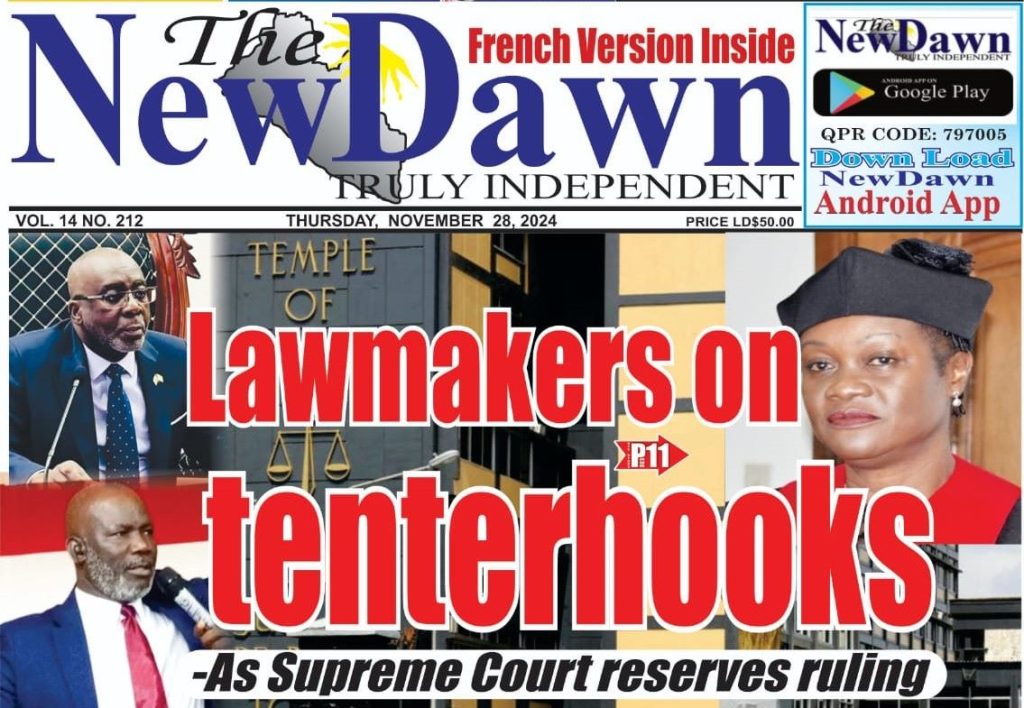On November 27, 2024, arguments were presented in Liberia’s Supreme Court regarding a protracted crisis within the House of Representatives. The court announced it would reserve a ruling on the matter, leaving parties on edge as they await the judicial decision. Central to the dispute is the embattled House Speaker, J. Alex Koffa, who secured a temporary stay order while contesting a controversial election in which Rep. Richard Nagbe Koon was elected by absentee lawmakers. Koffa and his supporters argue that Koon’s election, carried out without the presence of sufficient lawmakers, is illegal. Over the last month, efforts by the absentee lawmakers to replace Koffa have faltered due to a lack of the necessary majority amidst Koffa’s resistance.
The arguments presented in court highlighted two divergent positions. On one side, representatives of the majority bloc, led by Cllr. Varney Sherman, asserted that the legislative branch possesses the authority to remove its Speaker. Their defense emphasized a procedural adherence to the rules governing the legislature, claiming due process was followed. According to Sherman and his team, Koffa was duly notified of the session convened by the majority bloc but failed to attend. They contended that the House’s internal mechanics do not require judicial interference unless there’s a clear constitutional violation.
In contrast, Koffa’s legal team, represented by Cllr. Arthur Johnson, vehemently opposed the legitimacy of the majority bloc’s actions. They called for the court to declare Koon’s election unconstitutional and insisted that the posited removal of Koffa disregarded both the Constitution and the House’s operational rules. The pro-Koffa faction argued that significant decisions stemming from the majority bloc were rendered invalid due to the illegitimacy of their session, as it was not presided over by an officially recognized Speaker, and thus was an infringement on constitutional protocols.
The legal discussions also reflected broader implications for the separation of powers within the Liberian government. The Ministry of Justice was invited as a third party to provide its perspective on whether the ongoing issues within the House violate any constitutional statutes. It advised the court to consider the matter strictly under constitutional guidelines and opined that no such violations occurred. This response helped frame the debate, suggesting that the roles and responsibilities of the legislative body should be respected without judicial encroachment unless absolutely necessary.
The court has yet to indicate when it will deliver its ruling, which adds to the already prevailing uncertainty surrounding the situation in the House of Representatives. The issues under scrutiny not only concern the political power dynamics between factions within the legislature but also raise questions about legislative autonomy and the judiciary’s role in political matters in Liberia. The potential for setting a precedent looms large as the court deliberates on its position regarding legislative authority and the implications of Koffa’s contested removal.
As both sides await the Supreme Court’s decision, the political landscape in Liberia remains tense and unpredictable. The ruling may establish significant precedents about the balance of power between the branches of government and could redefine how legislative processes are conducted. Regardless of the outcome, the ongoing struggle reflects deeper issues within the political framework of Liberia, underscoring the challenges faced in governance, the rule of law, and the functioning of democracy in the country amidst political rivalry and factionalism.


